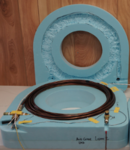
ESPRI Data Centre (former Ether)
ESPRI is a data centre of the French Atmosphere Infrastructure AERIS
ESPRI is a data centre of the French Atmosphere Infrastructure AERIS

.................................
AirCore home page
......................................
Access to the datasets
.................................
AirCore
The AirCore mission
The AirCore is an innovative air sampling system that allows retrieving vertical profiles of greenhouse gas mixing ratios. It stems from an idea originally developed by Pieter Tans of NOAA/ESRL (Tans, 2009, Karion et al., 2010): that a long tube descending from a high altitude with one end open and the other closed can sample and retain a mole fraction profile of a gas to be analyzed at a later date. While ascending to approximately 30 km, the AirCore evacuates to ambient pressure ; while descending under a balloon or a parachute, surrounding air flows into the AirCore tube to maintain equal pressure with the air outside. At each pressure level, an equal mass of air enters the tube, collecting a profile of the atmospheric column. The open end of the AirCore is sealed upon landing, preserving the atmospheric sample inside. The inside air is then pushed through a gas analyser. Using the temperature and pressure data measured by an electronic package flying under the balloon, it is possible to capture a continuous profile (in contrast with discrete flask sampling).Several versions of the AirCore, characterised by high or low vertical resolution, have been designed at LMD: the AirCore-HR and the AirCore-light. They have been flown during CNES StratoSciences campaigns in Timmins, Ontario, Canada in 2014 and 2015, as well as in Kiruna, Sweden, in 2016.
Data available from AERIS
AirCore level 2 vertical profiles of CO2 and CH4 are available from AERIS for 2014 in AMES format.Documentation
Membrive O., Crevoisier C.,Hertzog A., Danis F., Sourgen D., Barbé B., Amarouche N., Samaké J.-C., Frérot F., Durry G., Joly L., Decarpenterie T. , Cousin J., Engel A., Bönisch H., Louvel S., Renard J.-B., Des ballons pour le climat, La Météorologie, 91, 2015, doi : 10.4267/2042/57848.Membrive O., Crevoisier C., Sweeney C., Danis F., Hertzog A., Engel A., Bönisch H, and Picon L., AirCore-HR: A high resolution column sampling to enhance the vertical description of CH4 and CO2, submitted to Atm. Meas. Tech., 2016.
http://ara.abct.lmd.polytechnique.fr/index.php?page=aircore


